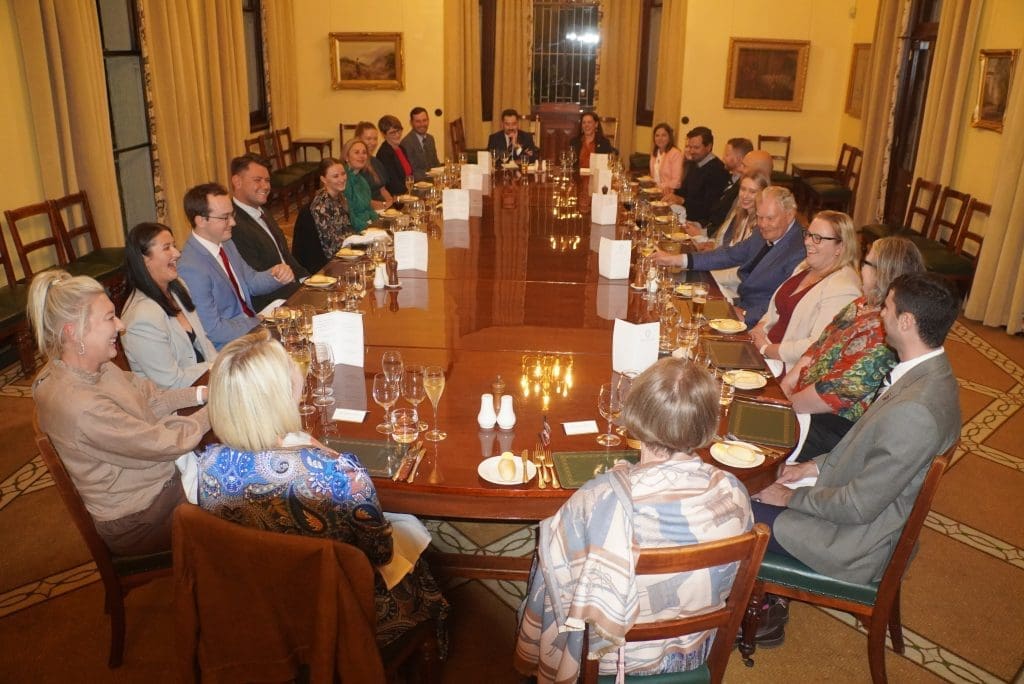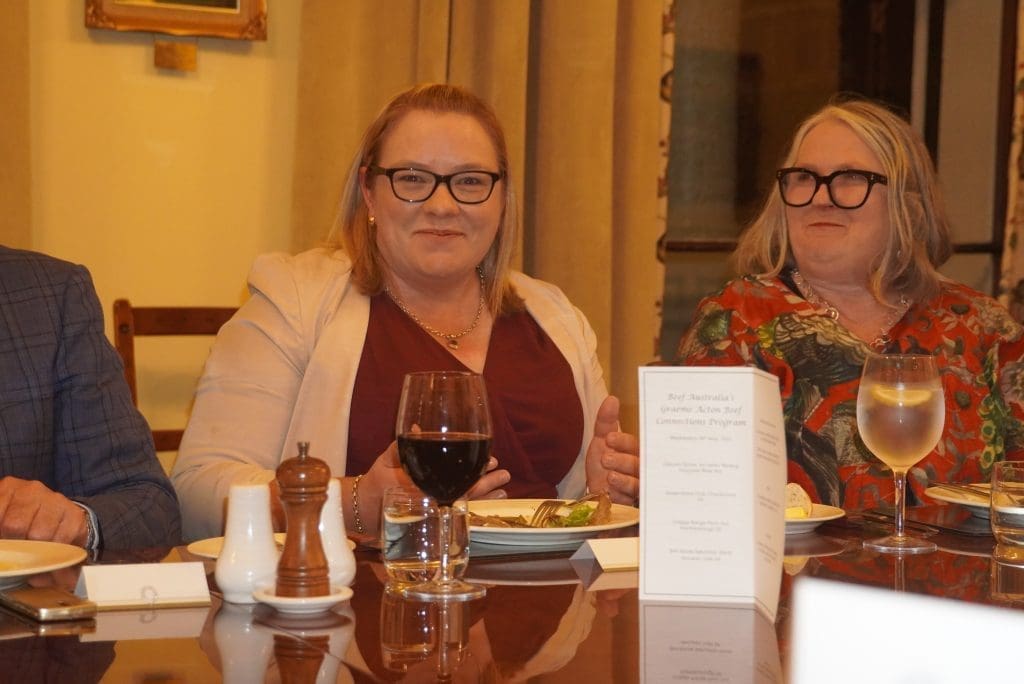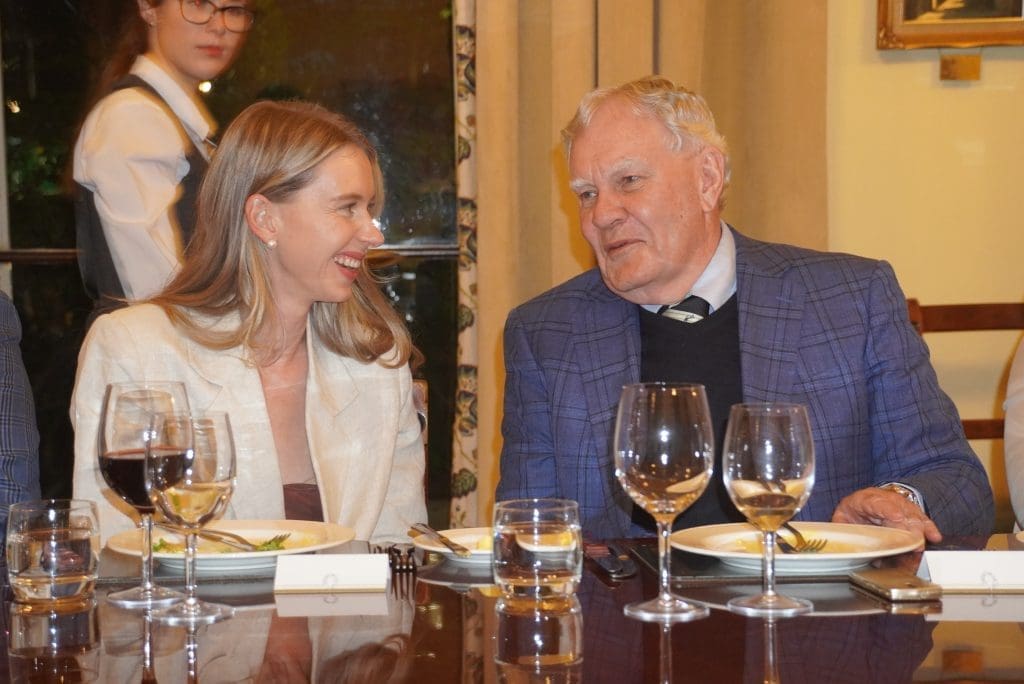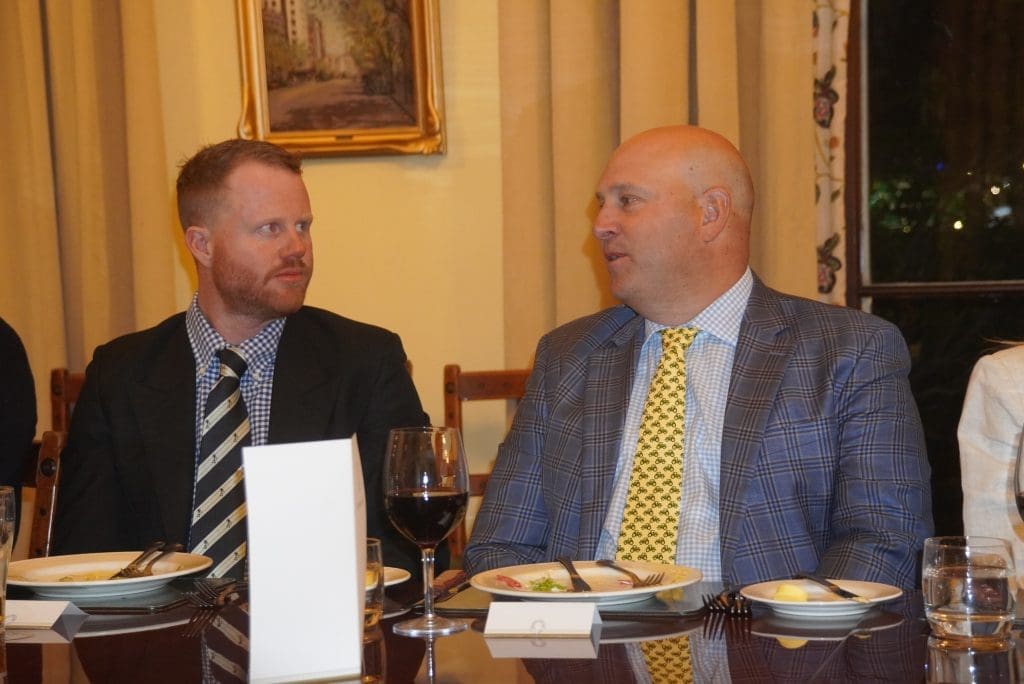
Beef Connections 2024 mentees and a group of industry leaders enjoying dinner in Brisbane’s Queensland Club last week.
TAKE one part youthful enthusiasm and energy; add a dash of ambition and a sprinkle of accumulated wisdom and knowledge.
This is the powerful brew that will drive the success of the 2024 Graeme Acton Beef Connections mentoring program between now and next May’s Beef Australia 2024 Expo in Rockhampton.
The ten young beef industry stakeholders chosen from 72 candidates who applied for this year’s fourth intake Beef Connections program met face-to-face for the first time last week, and the collective buzz was infectious.
This year’s mentees come from a broad spectrum of backgrounds across the beef supply chain, including northern and southern beef production, seedstock, lotfeeding, meat processing, supermarket retail, agency and agtech. They include:
- Liam Cameron, Te Mania Angus, Hexham, VIC
- Amy Wicks, Wicks and Co, Murgon, QLD
- Georgia Dale, Black Box Co, Capella, QLD
- Lachlan Smith, Redland Park & Brodie Agencies, Julia Creek, QLD
- Phoebe Eckermann, University of Adelaide
- Isobel Heffernan, NT Cattlemen’s Assn, Darwin, NT
- Jean Liebenberg, JBS Australia, Brisbane, QLD
- Lauren Angus, Signature Beef, Clermont, QLD
- Xavier McCluskey, Woolworths’ Greenstock, Tamworth, NSW
- Emily McNair, AA Co, QLD
The ten will be carefully matched with their industry mentors in coming weeks to guide their chosen project’s development. All ten will deliver on their work during Beef 2024 in Rockhampton next May.
 This year’s program coordinators are leadership development specialists Wendy Agar and Jo Eady, who replace long-serving founder, Barb Bishop.
This year’s program coordinators are leadership development specialists Wendy Agar and Jo Eady, who replace long-serving founder, Barb Bishop.
Also attending last week’s program launch dinner in Brisbane was Jenny Acton, wife of the late Graeme Acton, the former Beef Expo chairman after whom the program is named.
Big ideas, but how to execute them?
Beef Central attended the program launch dinner hosted by Beef Australia chair Bryce Camm, and heard about some of the ambitious projects the participants plan to work on with their mentors over the next 11 months.
They ranged from finding creative ways to better integrate data into beef production systems, novel packaging solutions that not only value-add parts of the carcase that are currently under-utilised, but enhance sustainability; and gathering performance and production data at regional level to allow for benchmarking and evidence-based policy development and decision-making at state farm organisation level.
Connecting stakeholders
South Burnett (QLD) Beef Connections participant Amy Wicks, co-proprietor of the Wicks & Co stock and station agency business operating out of Murgon, shared her project vision. Amy wants to build an integrated leasing and marketing platform that provides aspiring farmers with the opportunity to engage and connect with retired, semi-retired and even absentee landowners, to deliver a channel to help them enter the cattle industry.
Financial constraints often made it difficult if not impossible for aspiring young individuals to get a start in the beef industry, she said.
“And for those who are fortunate enough to buy their first property, they often don’t have the financial resources to a) stock it, or b) buy machinery and equipment to run it at a standard they would want to,” Amy said.
In what would act like a ‘match-making’ process, her proposed platform would cultivate partnerships that would allow for the land to be better utilised and run closer to its potential.
In her own region of the South Burnett, Amy said there were a lot of properties held by older landowners who really wanted to stay on their farms, for lifestyle reasons. But as they get older, they tended to reduce the amount of work they could do, leading to deterioration and under-utilisation of the asset.
“On some places, they may be down to fattening ten or twenty steers a year, because it’s what they love doing – but the holding often has greater capacity,” she said.
There was also potential to aggregate smaller holdings held by multiple owners into larger enterprises that were more viable for a young starter.
“There’s opportunity for better collaboration across the industry,” Amy said.
“One of the things my generation is quite good at is reaching out and asking for help, and utilising each other and networks. I think there is a great opportunity to share resources and knowledge in this way, coming together in a supportive environment to enable young people to move forward as beef producers.”

Beef Connections mentee Amy Wicks from Wicks and Co, Murgon, QLD with program coordinator Jo Eady.
Slow burn
Amy said she had ‘sat on’ her idea for the past eight or nine years, as other commitments including family and developing her own agency business got in the way.
“It got to the point where I didn’t know how to take the project to the next level. As a result of our business dealings with local clients, I have developed better understanding and insight of what’s happening in my local community and what is needed. But I also now have better skills and knowledge to take it to the next level.
“I put it in the bottom drawer for years, but everything happens for a reason. When I saw the Graeme Acton Beef Connections opportunity come up, I just felt like it was my time.”
Asked what sort of mentor she was hoping to be linked up with, Amy said she was hoping for somebody who was broadly connected, and was comfortable thinking ‘outside the box.’
“Ideally he or she is a real change-maker – somebody who has an appetite to innovate,” she said.
Sage advice
There was some sage advice provided to the young Beef Connections participants by invited industry guests at the inaugural group gathering last week, as they start their 11-month journey.
The value in challenging young people in any organisation was emphasised by several industry leaders in attendance.
Staff turnover, particularly among young people, was recognised as a risk. “Get your leaders in the business right, and you will see that turnover reduce,” was the advice of Australian Country Choice chief executive, Anthony Lee.
Mr Lee told the group not be afraid to ask questions.
“In our business, we are looking hard at the talent we already have within the business. It’s very easy to go outside the business to recruit a manager, but I love the fact that we are trying to promote from within. ACC in fact has a KPI on internal promotions. We already know their talent, capability, values and ethics – the rest you can train,” he said.
“Bringing new people in, you are never quite sure of that, but promoting internally, you can recognise the great cultural people in your business, and we are seeing massive rewards in all parts of our business from that. You can build capability on the back of culture and values.”

Beef Australia board member and retired agribusiness lawyer Rodney Bell, with Beef Connections mentee Georgia Dale, Black Box Co, Capella, QLD
From manufacturing to technology
John Deere Australia chief executive Luke Chandler was asked how much the power of the ‘John Deere brand’ had helped or hindered in the company’s staff recruitment process.
He told the group one of the big transformations his business had been going through was transitioning from being an agricultural/manufacturing company for the past 186 years, to increasingly over the past few years regarding itself also as a technology company.
“John Deere now recruits more software engineers than mechanical engineers,” Mr Chandler said.
“In doing that, we’re trying to tap into a talent base that we have not approached before. The brand, John Deere, in fact doesn’t mean a lot in Silicon Valley, or places like that. We’ve had to get creative in the way we try to recruit – people who can do coding, or work on algorithms, and similar things.
“We now have offices in places like Silicon Valley and downtown Chicago – as well as head office in out-of-the-way Moline, Illinois – because we are trying to attract a more diverse talent pool.”
“That, in turn, changes the culture of the company. We still have plenty of staff who grew up on farms in the US Midwest, or the Darling Downs, but equally there are now plenty of John Deere staff who do not have that agricultural background.”

John Deere Australia chief executive Luke Chandler with mentee Xavier McCluskey, Woolworths’ Greenstock, Tamworth, NSW
Sense of purpose
One feature that the beef industry and John Deere shared was ‘real sense of purpose,’ Mr Chandler said.
“We both talk a lot about how our customers feed, clothe and shelter the world. That sense of purpose is something a lot of companies don’t have. To me, the ‘company brand’ is one thing, but being able to talk to young talent about that sense of purpose creates connectivity and the retention that all companies are looking for,” he said.
“It’s probably something we all need to do more of, in terms of bringing great talent into our industry.”
Challenges
Callum Daley from meat grading technology developer MEQ told the group that young candidates considering a job in the meat industry often knew that they might get a financial bonus working in another sector or a company with a billion dollar turnover.
“But we can give them the challenge that they can’t get elsewhere – and that’s definitely how we motivate people,” he said.
“If you are working in a tech/agricultural company, you need half of the employees involved in the field, on day-to-day operations, and half on the tech side, keeping the company on the leading edge of technology developments.
“Blending that into one is the challenge. In agriculture, there’s a lack of expertise among technology advisors and consultants who can also relate to the practical ag side, and what needs to be done,” Mr Daley said.
“That’s where we have found there is a low bar at the moment – it’s definitely getting better, but if you can teach these young software engineers what it means to operate within a red meat processing plant, or out on a farm or in a feedlot, then it changes the way they think in how they interact in the work they’re doing.”
“The message is, fix this problem or find this solution, and you help feed the world.”



Well done to the mentors and mentees in this faboulous initiative. The connections made during this program will serve you well as they have served me over the past few years. I look forward to meeting you all at Beef2024.